Organisational Behaviour Report: BBC's Culture, Teams, and Motivation
VerifiedAdded on 2020/12/26
|16
|4236
|175
Report
AI Summary
This report provides an in-depth analysis of organisational behaviour within the context of the BBC. It begins by examining the influence of culture, politics, and power on the behaviour of managers, exploring Handy's model of organizational culture and the impact of power dynamics. The report then delves into content and process theories of motivation, including Maslow's hierarchy of needs and Vroom's expectancy theory, evaluating their application in motivating individuals and teams within the BBC. Furthermore, the report explores different types of teams, factors contributing to team effectiveness, and strategies for managing and improving team performance, productivity, and efficiency. The conclusion summarizes the key findings and recommendations for fostering a positive and productive work environment at the BBC.
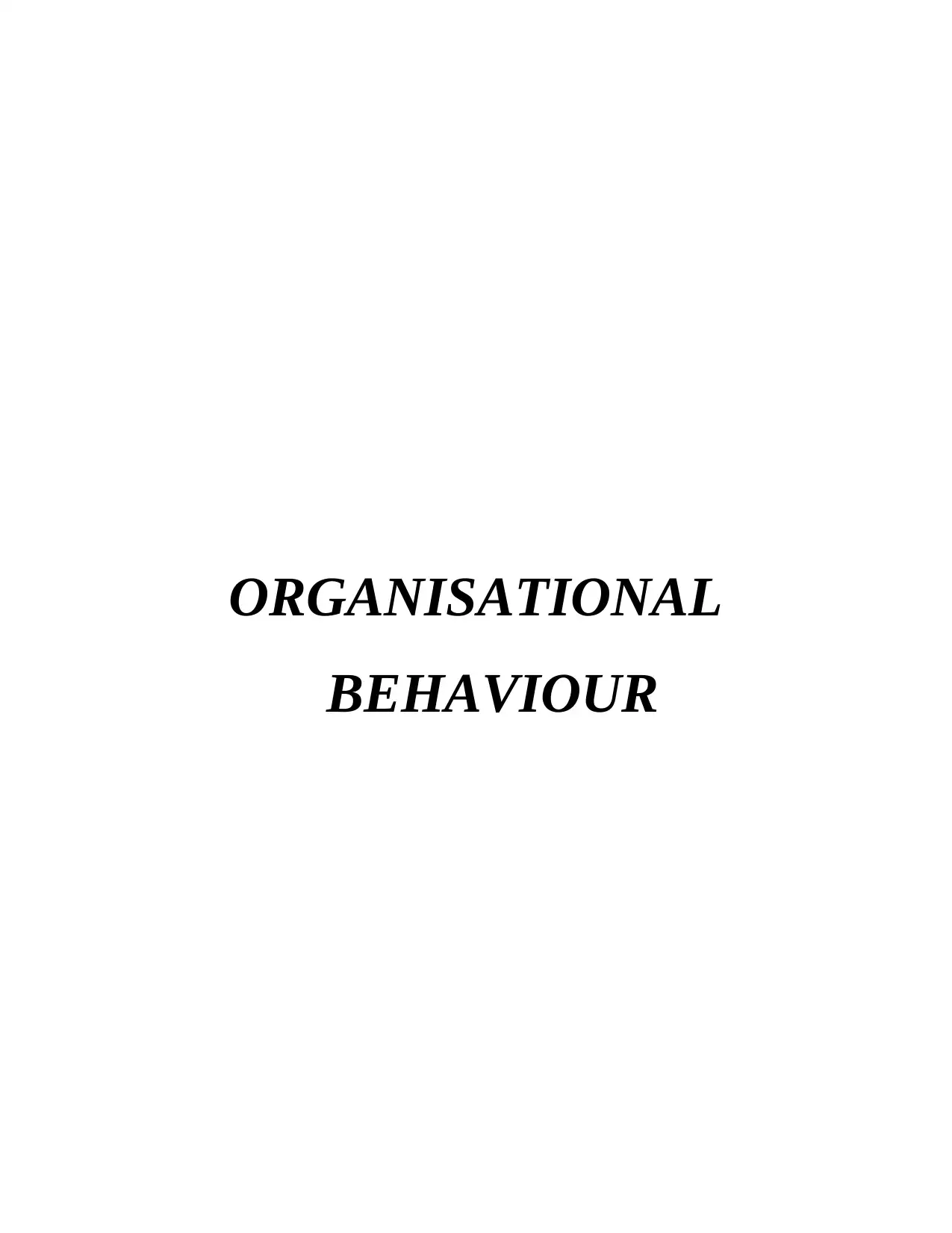
ORGANISATIONAL
BEHAVIOUR
BEHAVIOUR
Paraphrase This Document
Need a fresh take? Get an instant paraphrase of this document with our AI Paraphraser
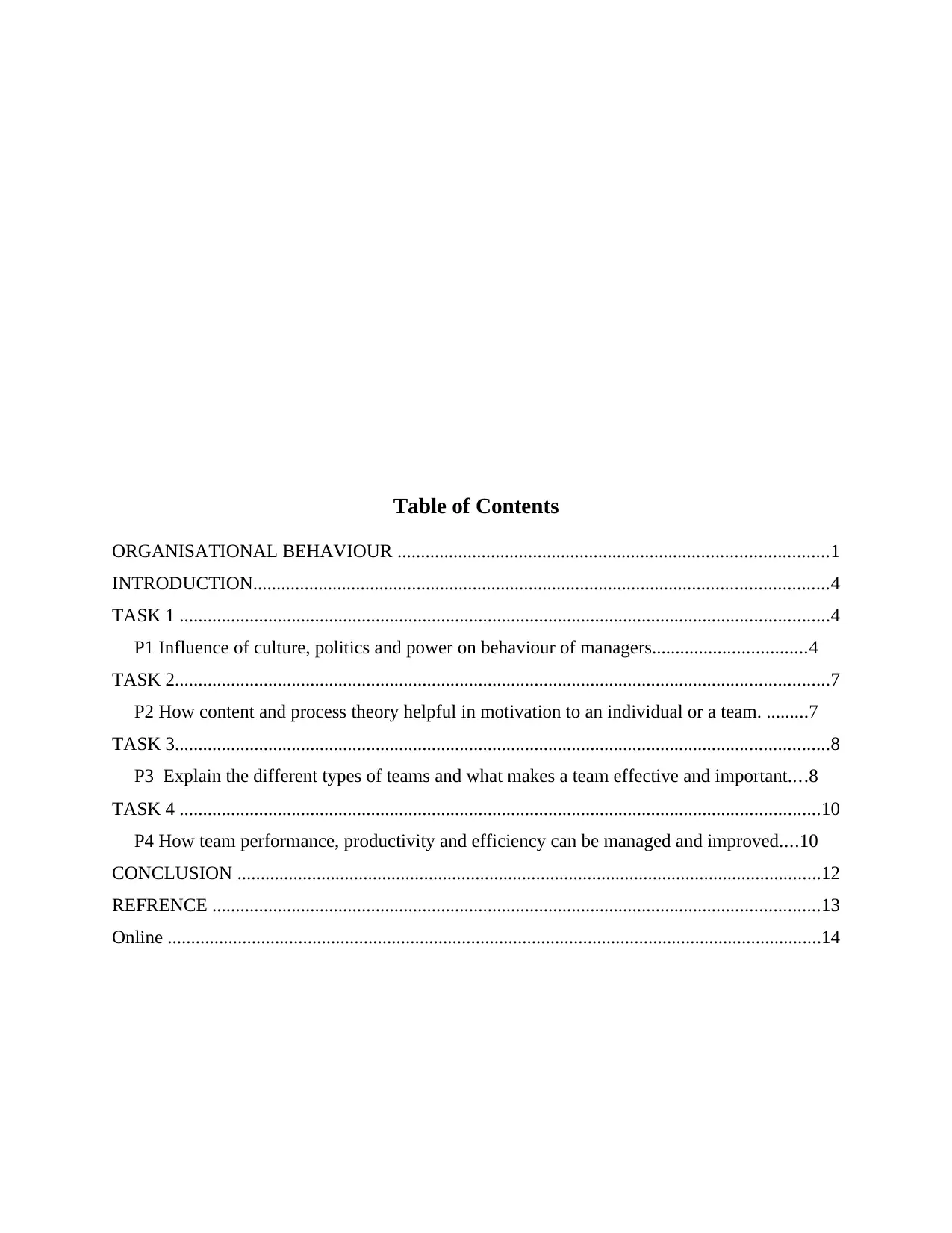
Table of Contents
ORGANISATIONAL BEHAVIOUR ............................................................................................1
INTRODUCTION...........................................................................................................................4
TASK 1 ...........................................................................................................................................4
P1 Influence of culture, politics and power on behaviour of managers.................................4
TASK 2............................................................................................................................................7
P2 How content and process theory helpful in motivation to an individual or a team. .........7
TASK 3............................................................................................................................................8
P3 Explain the different types of teams and what makes a team effective and important....8
TASK 4 .........................................................................................................................................10
P4 How team performance, productivity and efficiency can be managed and improved....10
CONCLUSION .............................................................................................................................12
REFRENCE ..................................................................................................................................13
Online ............................................................................................................................................14
ORGANISATIONAL BEHAVIOUR ............................................................................................1
INTRODUCTION...........................................................................................................................4
TASK 1 ...........................................................................................................................................4
P1 Influence of culture, politics and power on behaviour of managers.................................4
TASK 2............................................................................................................................................7
P2 How content and process theory helpful in motivation to an individual or a team. .........7
TASK 3............................................................................................................................................8
P3 Explain the different types of teams and what makes a team effective and important....8
TASK 4 .........................................................................................................................................10
P4 How team performance, productivity and efficiency can be managed and improved....10
CONCLUSION .............................................................................................................................12
REFRENCE ..................................................................................................................................13
Online ............................................................................................................................................14

⊘ This is a preview!⊘
Do you want full access?
Subscribe today to unlock all pages.

Trusted by 1+ million students worldwide
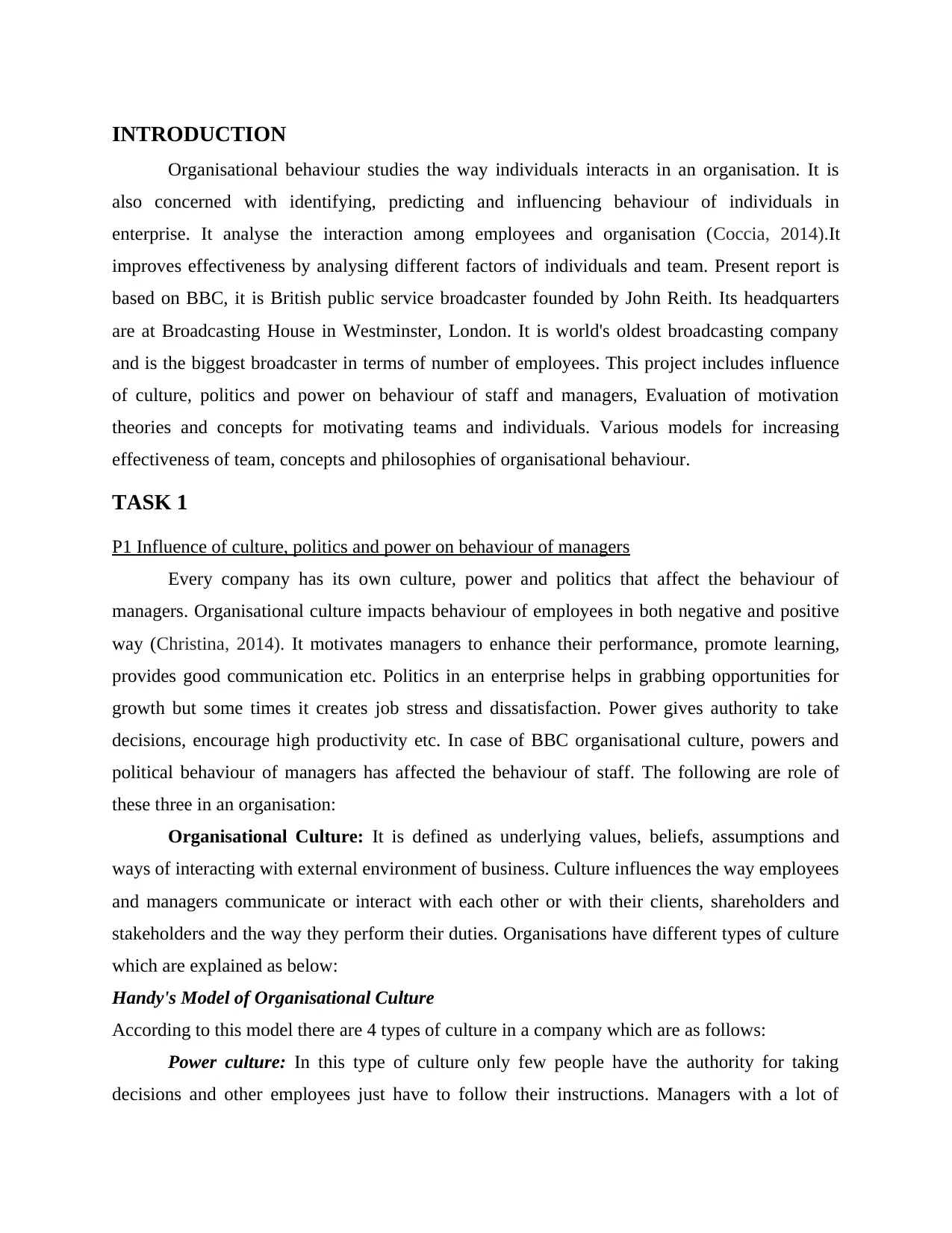
INTRODUCTION
Organisational behaviour studies the way individuals interacts in an organisation. It is
also concerned with identifying, predicting and influencing behaviour of individuals in
enterprise. It analyse the interaction among employees and organisation (Coccia, 2014).It
improves effectiveness by analysing different factors of individuals and team. Present report is
based on BBC, it is British public service broadcaster founded by John Reith. Its headquarters
are at Broadcasting House in Westminster, London. It is world's oldest broadcasting company
and is the biggest broadcaster in terms of number of employees. This project includes influence
of culture, politics and power on behaviour of staff and managers, Evaluation of motivation
theories and concepts for motivating teams and individuals. Various models for increasing
effectiveness of team, concepts and philosophies of organisational behaviour.
TASK 1
P1 Influence of culture, politics and power on behaviour of managers
Every company has its own culture, power and politics that affect the behaviour of
managers. Organisational culture impacts behaviour of employees in both negative and positive
way (Christina, 2014). It motivates managers to enhance their performance, promote learning,
provides good communication etc. Politics in an enterprise helps in grabbing opportunities for
growth but some times it creates job stress and dissatisfaction. Power gives authority to take
decisions, encourage high productivity etc. In case of BBC organisational culture, powers and
political behaviour of managers has affected the behaviour of staff. The following are role of
these three in an organisation:
Organisational Culture: It is defined as underlying values, beliefs, assumptions and
ways of interacting with external environment of business. Culture influences the way employees
and managers communicate or interact with each other or with their clients, shareholders and
stakeholders and the way they perform their duties. Organisations have different types of culture
which are explained as below:
Handy's Model of Organisational Culture
According to this model there are 4 types of culture in a company which are as follows:
Power culture: In this type of culture only few people have the authority for taking
decisions and other employees just have to follow their instructions. Managers with a lot of
Organisational behaviour studies the way individuals interacts in an organisation. It is
also concerned with identifying, predicting and influencing behaviour of individuals in
enterprise. It analyse the interaction among employees and organisation (Coccia, 2014).It
improves effectiveness by analysing different factors of individuals and team. Present report is
based on BBC, it is British public service broadcaster founded by John Reith. Its headquarters
are at Broadcasting House in Westminster, London. It is world's oldest broadcasting company
and is the biggest broadcaster in terms of number of employees. This project includes influence
of culture, politics and power on behaviour of staff and managers, Evaluation of motivation
theories and concepts for motivating teams and individuals. Various models for increasing
effectiveness of team, concepts and philosophies of organisational behaviour.
TASK 1
P1 Influence of culture, politics and power on behaviour of managers
Every company has its own culture, power and politics that affect the behaviour of
managers. Organisational culture impacts behaviour of employees in both negative and positive
way (Christina, 2014). It motivates managers to enhance their performance, promote learning,
provides good communication etc. Politics in an enterprise helps in grabbing opportunities for
growth but some times it creates job stress and dissatisfaction. Power gives authority to take
decisions, encourage high productivity etc. In case of BBC organisational culture, powers and
political behaviour of managers has affected the behaviour of staff. The following are role of
these three in an organisation:
Organisational Culture: It is defined as underlying values, beliefs, assumptions and
ways of interacting with external environment of business. Culture influences the way employees
and managers communicate or interact with each other or with their clients, shareholders and
stakeholders and the way they perform their duties. Organisations have different types of culture
which are explained as below:
Handy's Model of Organisational Culture
According to this model there are 4 types of culture in a company which are as follows:
Power culture: In this type of culture only few people have the authority for taking
decisions and other employees just have to follow their instructions. Managers with a lot of
Paraphrase This Document
Need a fresh take? Get an instant paraphrase of this document with our AI Paraphraser
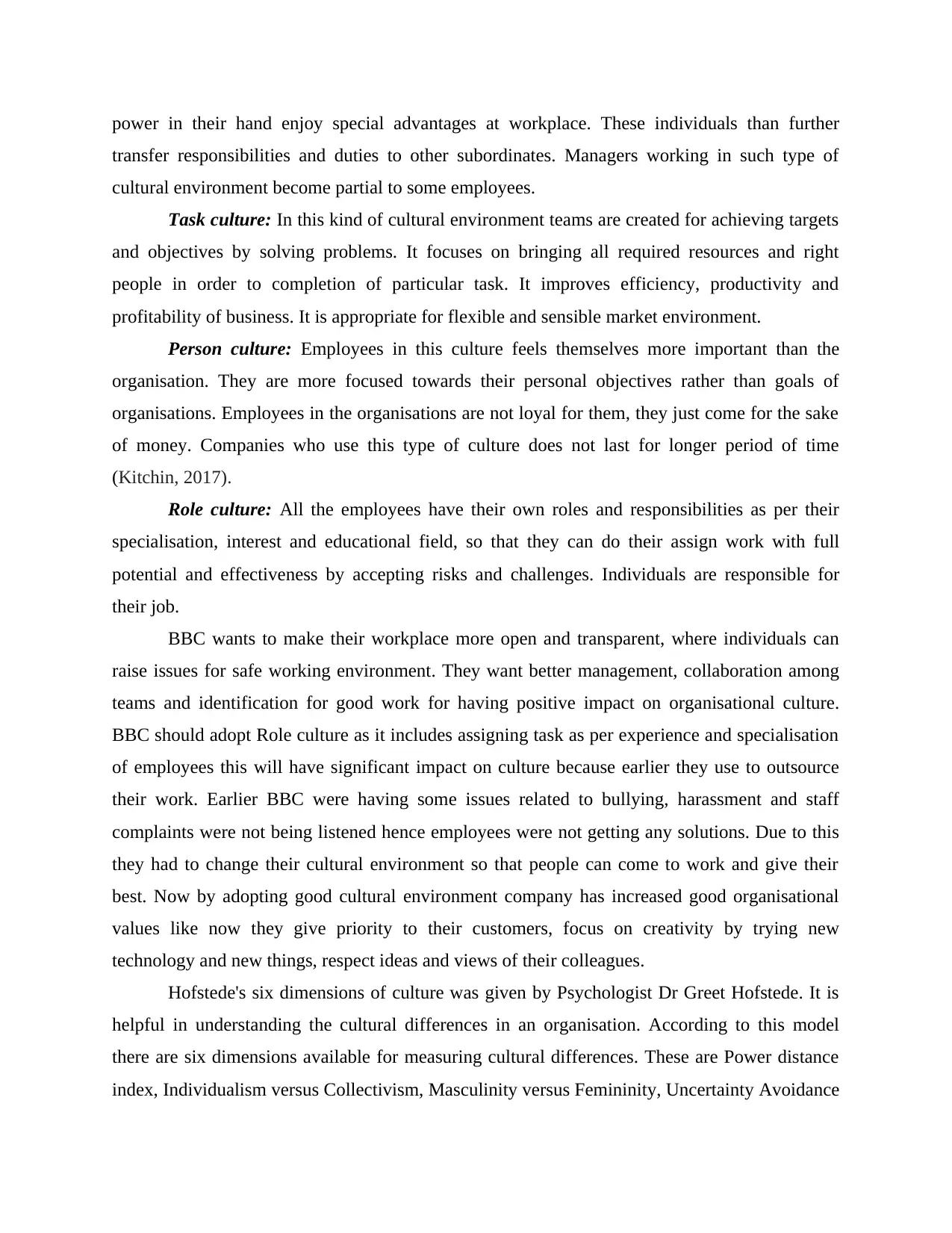
power in their hand enjoy special advantages at workplace. These individuals than further
transfer responsibilities and duties to other subordinates. Managers working in such type of
cultural environment become partial to some employees.
Task culture: In this kind of cultural environment teams are created for achieving targets
and objectives by solving problems. It focuses on bringing all required resources and right
people in order to completion of particular task. It improves efficiency, productivity and
profitability of business. It is appropriate for flexible and sensible market environment.
Person culture: Employees in this culture feels themselves more important than the
organisation. They are more focused towards their personal objectives rather than goals of
organisations. Employees in the organisations are not loyal for them, they just come for the sake
of money. Companies who use this type of culture does not last for longer period of time
(Kitchin, 2017).
Role culture: All the employees have their own roles and responsibilities as per their
specialisation, interest and educational field, so that they can do their assign work with full
potential and effectiveness by accepting risks and challenges. Individuals are responsible for
their job.
BBC wants to make their workplace more open and transparent, where individuals can
raise issues for safe working environment. They want better management, collaboration among
teams and identification for good work for having positive impact on organisational culture.
BBC should adopt Role culture as it includes assigning task as per experience and specialisation
of employees this will have significant impact on culture because earlier they use to outsource
their work. Earlier BBC were having some issues related to bullying, harassment and staff
complaints were not being listened hence employees were not getting any solutions. Due to this
they had to change their cultural environment so that people can come to work and give their
best. Now by adopting good cultural environment company has increased good organisational
values like now they give priority to their customers, focus on creativity by trying new
technology and new things, respect ideas and views of their colleagues.
Hofstede's six dimensions of culture was given by Psychologist Dr Greet Hofstede. It is
helpful in understanding the cultural differences in an organisation. According to this model
there are six dimensions available for measuring cultural differences. These are Power distance
index, Individualism versus Collectivism, Masculinity versus Femininity, Uncertainty Avoidance
transfer responsibilities and duties to other subordinates. Managers working in such type of
cultural environment become partial to some employees.
Task culture: In this kind of cultural environment teams are created for achieving targets
and objectives by solving problems. It focuses on bringing all required resources and right
people in order to completion of particular task. It improves efficiency, productivity and
profitability of business. It is appropriate for flexible and sensible market environment.
Person culture: Employees in this culture feels themselves more important than the
organisation. They are more focused towards their personal objectives rather than goals of
organisations. Employees in the organisations are not loyal for them, they just come for the sake
of money. Companies who use this type of culture does not last for longer period of time
(Kitchin, 2017).
Role culture: All the employees have their own roles and responsibilities as per their
specialisation, interest and educational field, so that they can do their assign work with full
potential and effectiveness by accepting risks and challenges. Individuals are responsible for
their job.
BBC wants to make their workplace more open and transparent, where individuals can
raise issues for safe working environment. They want better management, collaboration among
teams and identification for good work for having positive impact on organisational culture.
BBC should adopt Role culture as it includes assigning task as per experience and specialisation
of employees this will have significant impact on culture because earlier they use to outsource
their work. Earlier BBC were having some issues related to bullying, harassment and staff
complaints were not being listened hence employees were not getting any solutions. Due to this
they had to change their cultural environment so that people can come to work and give their
best. Now by adopting good cultural environment company has increased good organisational
values like now they give priority to their customers, focus on creativity by trying new
technology and new things, respect ideas and views of their colleagues.
Hofstede's six dimensions of culture was given by Psychologist Dr Greet Hofstede. It is
helpful in understanding the cultural differences in an organisation. According to this model
there are six dimensions available for measuring cultural differences. These are Power distance
index, Individualism versus Collectivism, Masculinity versus Femininity, Uncertainty Avoidance
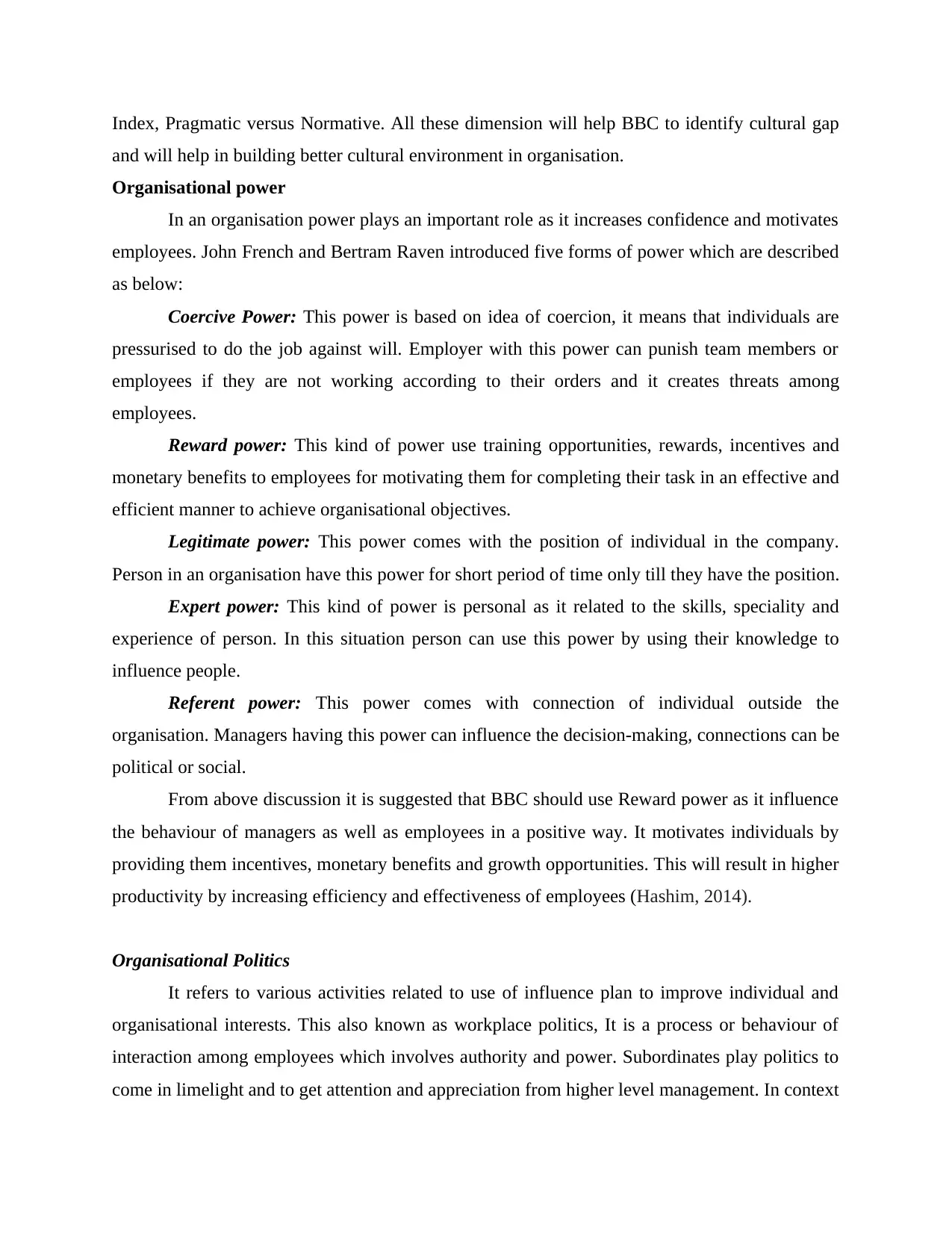
Index, Pragmatic versus Normative. All these dimension will help BBC to identify cultural gap
and will help in building better cultural environment in organisation.
Organisational power
In an organisation power plays an important role as it increases confidence and motivates
employees. John French and Bertram Raven introduced five forms of power which are described
as below:
Coercive Power: This power is based on idea of coercion, it means that individuals are
pressurised to do the job against will. Employer with this power can punish team members or
employees if they are not working according to their orders and it creates threats among
employees.
Reward power: This kind of power use training opportunities, rewards, incentives and
monetary benefits to employees for motivating them for completing their task in an effective and
efficient manner to achieve organisational objectives.
Legitimate power: This power comes with the position of individual in the company.
Person in an organisation have this power for short period of time only till they have the position.
Expert power: This kind of power is personal as it related to the skills, speciality and
experience of person. In this situation person can use this power by using their knowledge to
influence people.
Referent power: This power comes with connection of individual outside the
organisation. Managers having this power can influence the decision-making, connections can be
political or social.
From above discussion it is suggested that BBC should use Reward power as it influence
the behaviour of managers as well as employees in a positive way. It motivates individuals by
providing them incentives, monetary benefits and growth opportunities. This will result in higher
productivity by increasing efficiency and effectiveness of employees (Hashim, 2014).
Organisational Politics
It refers to various activities related to use of influence plan to improve individual and
organisational interests. This also known as workplace politics, It is a process or behaviour of
interaction among employees which involves authority and power. Subordinates play politics to
come in limelight and to get attention and appreciation from higher level management. In context
and will help in building better cultural environment in organisation.
Organisational power
In an organisation power plays an important role as it increases confidence and motivates
employees. John French and Bertram Raven introduced five forms of power which are described
as below:
Coercive Power: This power is based on idea of coercion, it means that individuals are
pressurised to do the job against will. Employer with this power can punish team members or
employees if they are not working according to their orders and it creates threats among
employees.
Reward power: This kind of power use training opportunities, rewards, incentives and
monetary benefits to employees for motivating them for completing their task in an effective and
efficient manner to achieve organisational objectives.
Legitimate power: This power comes with the position of individual in the company.
Person in an organisation have this power for short period of time only till they have the position.
Expert power: This kind of power is personal as it related to the skills, speciality and
experience of person. In this situation person can use this power by using their knowledge to
influence people.
Referent power: This power comes with connection of individual outside the
organisation. Managers having this power can influence the decision-making, connections can be
political or social.
From above discussion it is suggested that BBC should use Reward power as it influence
the behaviour of managers as well as employees in a positive way. It motivates individuals by
providing them incentives, monetary benefits and growth opportunities. This will result in higher
productivity by increasing efficiency and effectiveness of employees (Hashim, 2014).
Organisational Politics
It refers to various activities related to use of influence plan to improve individual and
organisational interests. This also known as workplace politics, It is a process or behaviour of
interaction among employees which involves authority and power. Subordinates play politics to
come in limelight and to get attention and appreciation from higher level management. In context
⊘ This is a preview!⊘
Do you want full access?
Subscribe today to unlock all pages.

Trusted by 1+ million students worldwide
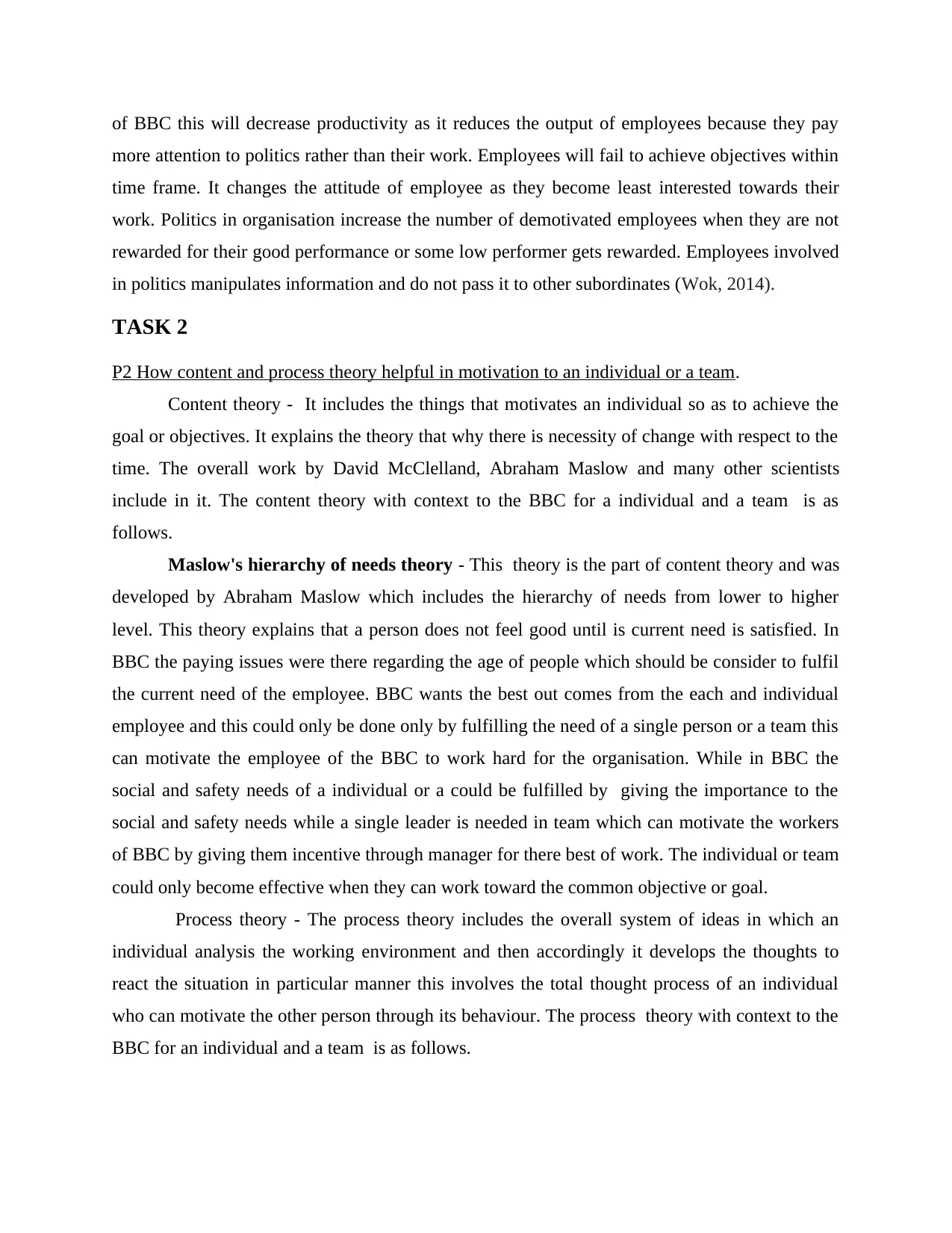
of BBC this will decrease productivity as it reduces the output of employees because they pay
more attention to politics rather than their work. Employees will fail to achieve objectives within
time frame. It changes the attitude of employee as they become least interested towards their
work. Politics in organisation increase the number of demotivated employees when they are not
rewarded for their good performance or some low performer gets rewarded. Employees involved
in politics manipulates information and do not pass it to other subordinates (Wok, 2014).
TASK 2
P2 How content and process theory helpful in motivation to an individual or a team.
Content theory - It includes the things that motivates an individual so as to achieve the
goal or objectives. It explains the theory that why there is necessity of change with respect to the
time. The overall work by David McClelland, Abraham Maslow and many other scientists
include in it. The content theory with context to the BBC for a individual and a team is as
follows.
Maslow's hierarchy of needs theory - This theory is the part of content theory and was
developed by Abraham Maslow which includes the hierarchy of needs from lower to higher
level. This theory explains that a person does not feel good until is current need is satisfied. In
BBC the paying issues were there regarding the age of people which should be consider to fulfil
the current need of the employee. BBC wants the best out comes from the each and individual
employee and this could only be done only by fulfilling the need of a single person or a team this
can motivate the employee of the BBC to work hard for the organisation. While in BBC the
social and safety needs of a individual or a could be fulfilled by giving the importance to the
social and safety needs while a single leader is needed in team which can motivate the workers
of BBC by giving them incentive through manager for there best of work. The individual or team
could only become effective when they can work toward the common objective or goal.
Process theory - The process theory includes the overall system of ideas in which an
individual analysis the working environment and then accordingly it develops the thoughts to
react the situation in particular manner this involves the total thought process of an individual
who can motivate the other person through its behaviour. The process theory with context to the
BBC for an individual and a team is as follows.
more attention to politics rather than their work. Employees will fail to achieve objectives within
time frame. It changes the attitude of employee as they become least interested towards their
work. Politics in organisation increase the number of demotivated employees when they are not
rewarded for their good performance or some low performer gets rewarded. Employees involved
in politics manipulates information and do not pass it to other subordinates (Wok, 2014).
TASK 2
P2 How content and process theory helpful in motivation to an individual or a team.
Content theory - It includes the things that motivates an individual so as to achieve the
goal or objectives. It explains the theory that why there is necessity of change with respect to the
time. The overall work by David McClelland, Abraham Maslow and many other scientists
include in it. The content theory with context to the BBC for a individual and a team is as
follows.
Maslow's hierarchy of needs theory - This theory is the part of content theory and was
developed by Abraham Maslow which includes the hierarchy of needs from lower to higher
level. This theory explains that a person does not feel good until is current need is satisfied. In
BBC the paying issues were there regarding the age of people which should be consider to fulfil
the current need of the employee. BBC wants the best out comes from the each and individual
employee and this could only be done only by fulfilling the need of a single person or a team this
can motivate the employee of the BBC to work hard for the organisation. While in BBC the
social and safety needs of a individual or a could be fulfilled by giving the importance to the
social and safety needs while a single leader is needed in team which can motivate the workers
of BBC by giving them incentive through manager for there best of work. The individual or team
could only become effective when they can work toward the common objective or goal.
Process theory - The process theory includes the overall system of ideas in which an
individual analysis the working environment and then accordingly it develops the thoughts to
react the situation in particular manner this involves the total thought process of an individual
who can motivate the other person through its behaviour. The process theory with context to the
BBC for an individual and a team is as follows.
Paraphrase This Document
Need a fresh take? Get an instant paraphrase of this document with our AI Paraphraser
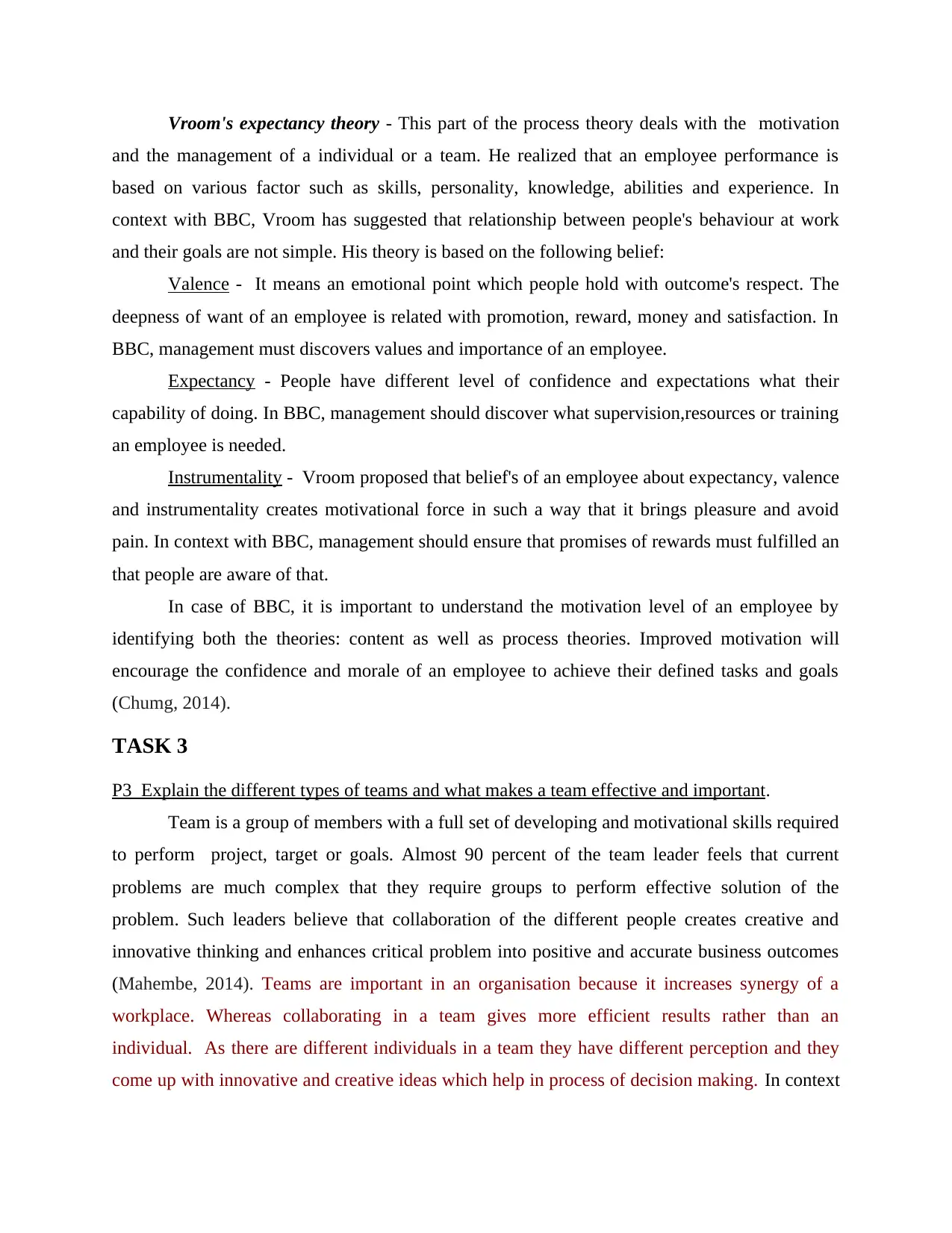
Vroom's expectancy theory - This part of the process theory deals with the motivation
and the management of a individual or a team. He realized that an employee performance is
based on various factor such as skills, personality, knowledge, abilities and experience. In
context with BBC, Vroom has suggested that relationship between people's behaviour at work
and their goals are not simple. His theory is based on the following belief:
Valence - It means an emotional point which people hold with outcome's respect. The
deepness of want of an employee is related with promotion, reward, money and satisfaction. In
BBC, management must discovers values and importance of an employee.
Expectancy - People have different level of confidence and expectations what their
capability of doing. In BBC, management should discover what supervision,resources or training
an employee is needed.
Instrumentality - Vroom proposed that belief's of an employee about expectancy, valence
and instrumentality creates motivational force in such a way that it brings pleasure and avoid
pain. In context with BBC, management should ensure that promises of rewards must fulfilled an
that people are aware of that.
In case of BBC, it is important to understand the motivation level of an employee by
identifying both the theories: content as well as process theories. Improved motivation will
encourage the confidence and morale of an employee to achieve their defined tasks and goals
(Chumg, 2014).
TASK 3
P3 Explain the different types of teams and what makes a team effective and important.
Team is a group of members with a full set of developing and motivational skills required
to perform project, target or goals. Almost 90 percent of the team leader feels that current
problems are much complex that they require groups to perform effective solution of the
problem. Such leaders believe that collaboration of the different people creates creative and
innovative thinking and enhances critical problem into positive and accurate business outcomes
(Mahembe, 2014). Teams are important in an organisation because it increases synergy of a
workplace. Whereas collaborating in a team gives more efficient results rather than an
individual. As there are different individuals in a team they have different perception and they
come up with innovative and creative ideas which help in process of decision making. In context
and the management of a individual or a team. He realized that an employee performance is
based on various factor such as skills, personality, knowledge, abilities and experience. In
context with BBC, Vroom has suggested that relationship between people's behaviour at work
and their goals are not simple. His theory is based on the following belief:
Valence - It means an emotional point which people hold with outcome's respect. The
deepness of want of an employee is related with promotion, reward, money and satisfaction. In
BBC, management must discovers values and importance of an employee.
Expectancy - People have different level of confidence and expectations what their
capability of doing. In BBC, management should discover what supervision,resources or training
an employee is needed.
Instrumentality - Vroom proposed that belief's of an employee about expectancy, valence
and instrumentality creates motivational force in such a way that it brings pleasure and avoid
pain. In context with BBC, management should ensure that promises of rewards must fulfilled an
that people are aware of that.
In case of BBC, it is important to understand the motivation level of an employee by
identifying both the theories: content as well as process theories. Improved motivation will
encourage the confidence and morale of an employee to achieve their defined tasks and goals
(Chumg, 2014).
TASK 3
P3 Explain the different types of teams and what makes a team effective and important.
Team is a group of members with a full set of developing and motivational skills required
to perform project, target or goals. Almost 90 percent of the team leader feels that current
problems are much complex that they require groups to perform effective solution of the
problem. Such leaders believe that collaboration of the different people creates creative and
innovative thinking and enhances critical problem into positive and accurate business outcomes
(Mahembe, 2014). Teams are important in an organisation because it increases synergy of a
workplace. Whereas collaborating in a team gives more efficient results rather than an
individual. As there are different individuals in a team they have different perception and they
come up with innovative and creative ideas which help in process of decision making. In context
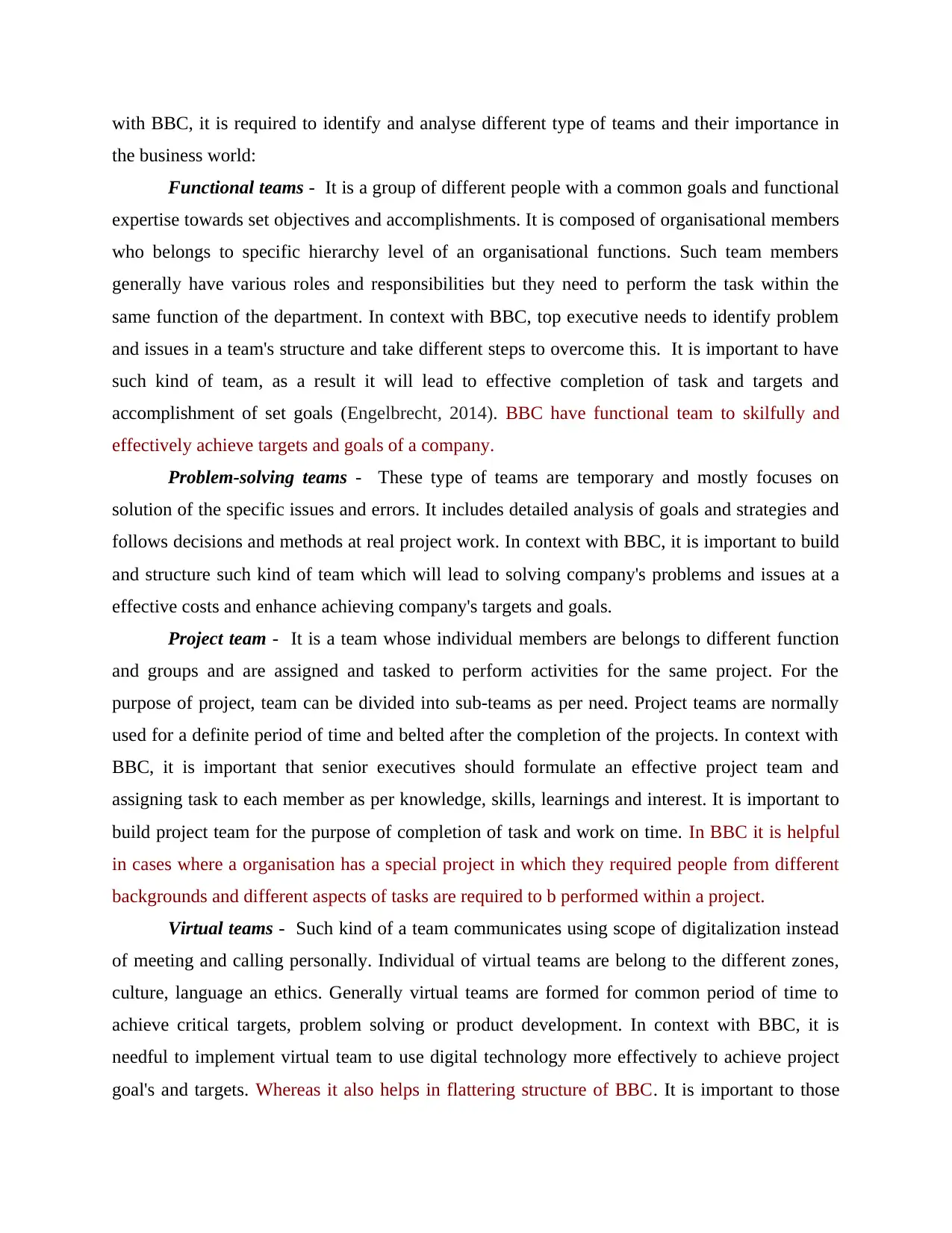
with BBC, it is required to identify and analyse different type of teams and their importance in
the business world:
Functional teams - It is a group of different people with a common goals and functional
expertise towards set objectives and accomplishments. It is composed of organisational members
who belongs to specific hierarchy level of an organisational functions. Such team members
generally have various roles and responsibilities but they need to perform the task within the
same function of the department. In context with BBC, top executive needs to identify problem
and issues in a team's structure and take different steps to overcome this. It is important to have
such kind of team, as a result it will lead to effective completion of task and targets and
accomplishment of set goals (Engelbrecht, 2014). BBC have functional team to skilfully and
effectively achieve targets and goals of a company.
Problem-solving teams - These type of teams are temporary and mostly focuses on
solution of the specific issues and errors. It includes detailed analysis of goals and strategies and
follows decisions and methods at real project work. In context with BBC, it is important to build
and structure such kind of team which will lead to solving company's problems and issues at a
effective costs and enhance achieving company's targets and goals.
Project team - It is a team whose individual members are belongs to different function
and groups and are assigned and tasked to perform activities for the same project. For the
purpose of project, team can be divided into sub-teams as per need. Project teams are normally
used for a definite period of time and belted after the completion of the projects. In context with
BBC, it is important that senior executives should formulate an effective project team and
assigning task to each member as per knowledge, skills, learnings and interest. It is important to
build project team for the purpose of completion of task and work on time. In BBC it is helpful
in cases where a organisation has a special project in which they required people from different
backgrounds and different aspects of tasks are required to b performed within a project.
Virtual teams - Such kind of a team communicates using scope of digitalization instead
of meeting and calling personally. Individual of virtual teams are belong to the different zones,
culture, language an ethics. Generally virtual teams are formed for common period of time to
achieve critical targets, problem solving or product development. In context with BBC, it is
needful to implement virtual team to use digital technology more effectively to achieve project
goal's and targets. Whereas it also helps in flattering structure of BBC. It is important to those
the business world:
Functional teams - It is a group of different people with a common goals and functional
expertise towards set objectives and accomplishments. It is composed of organisational members
who belongs to specific hierarchy level of an organisational functions. Such team members
generally have various roles and responsibilities but they need to perform the task within the
same function of the department. In context with BBC, top executive needs to identify problem
and issues in a team's structure and take different steps to overcome this. It is important to have
such kind of team, as a result it will lead to effective completion of task and targets and
accomplishment of set goals (Engelbrecht, 2014). BBC have functional team to skilfully and
effectively achieve targets and goals of a company.
Problem-solving teams - These type of teams are temporary and mostly focuses on
solution of the specific issues and errors. It includes detailed analysis of goals and strategies and
follows decisions and methods at real project work. In context with BBC, it is important to build
and structure such kind of team which will lead to solving company's problems and issues at a
effective costs and enhance achieving company's targets and goals.
Project team - It is a team whose individual members are belongs to different function
and groups and are assigned and tasked to perform activities for the same project. For the
purpose of project, team can be divided into sub-teams as per need. Project teams are normally
used for a definite period of time and belted after the completion of the projects. In context with
BBC, it is important that senior executives should formulate an effective project team and
assigning task to each member as per knowledge, skills, learnings and interest. It is important to
build project team for the purpose of completion of task and work on time. In BBC it is helpful
in cases where a organisation has a special project in which they required people from different
backgrounds and different aspects of tasks are required to b performed within a project.
Virtual teams - Such kind of a team communicates using scope of digitalization instead
of meeting and calling personally. Individual of virtual teams are belong to the different zones,
culture, language an ethics. Generally virtual teams are formed for common period of time to
achieve critical targets, problem solving or product development. In context with BBC, it is
needful to implement virtual team to use digital technology more effectively to achieve project
goal's and targets. Whereas it also helps in flattering structure of BBC. It is important to those
⊘ This is a preview!⊘
Do you want full access?
Subscribe today to unlock all pages.

Trusted by 1+ million students worldwide
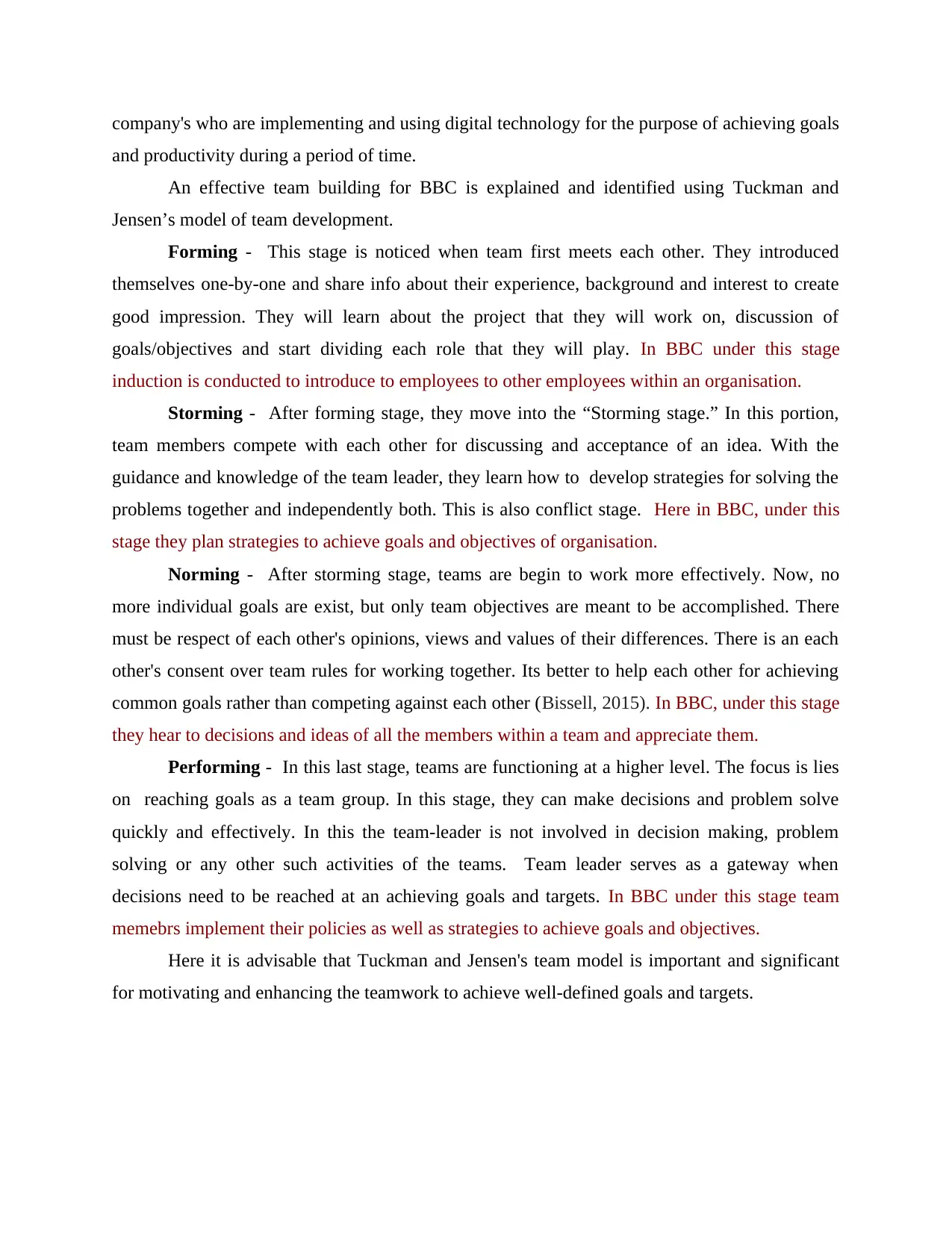
company's who are implementing and using digital technology for the purpose of achieving goals
and productivity during a period of time.
An effective team building for BBC is explained and identified using Tuckman and
Jensen’s model of team development.
Forming - This stage is noticed when team first meets each other. They introduced
themselves one-by-one and share info about their experience, background and interest to create
good impression. They will learn about the project that they will work on, discussion of
goals/objectives and start dividing each role that they will play. In BBC under this stage
induction is conducted to introduce to employees to other employees within an organisation.
Storming - After forming stage, they move into the “Storming stage.” In this portion,
team members compete with each other for discussing and acceptance of an idea. With the
guidance and knowledge of the team leader, they learn how to develop strategies for solving the
problems together and independently both. This is also conflict stage. Here in BBC, under this
stage they plan strategies to achieve goals and objectives of organisation.
Norming - After storming stage, teams are begin to work more effectively. Now, no
more individual goals are exist, but only team objectives are meant to be accomplished. There
must be respect of each other's opinions, views and values of their differences. There is an each
other's consent over team rules for working together. Its better to help each other for achieving
common goals rather than competing against each other (Bissell, 2015). In BBC, under this stage
they hear to decisions and ideas of all the members within a team and appreciate them.
Performing - In this last stage, teams are functioning at a higher level. The focus is lies
on reaching goals as a team group. In this stage, they can make decisions and problem solve
quickly and effectively. In this the team-leader is not involved in decision making, problem
solving or any other such activities of the teams. Team leader serves as a gateway when
decisions need to be reached at an achieving goals and targets. In BBC under this stage team
memebrs implement their policies as well as strategies to achieve goals and objectives.
Here it is advisable that Tuckman and Jensen's team model is important and significant
for motivating and enhancing the teamwork to achieve well-defined goals and targets.
and productivity during a period of time.
An effective team building for BBC is explained and identified using Tuckman and
Jensen’s model of team development.
Forming - This stage is noticed when team first meets each other. They introduced
themselves one-by-one and share info about their experience, background and interest to create
good impression. They will learn about the project that they will work on, discussion of
goals/objectives and start dividing each role that they will play. In BBC under this stage
induction is conducted to introduce to employees to other employees within an organisation.
Storming - After forming stage, they move into the “Storming stage.” In this portion,
team members compete with each other for discussing and acceptance of an idea. With the
guidance and knowledge of the team leader, they learn how to develop strategies for solving the
problems together and independently both. This is also conflict stage. Here in BBC, under this
stage they plan strategies to achieve goals and objectives of organisation.
Norming - After storming stage, teams are begin to work more effectively. Now, no
more individual goals are exist, but only team objectives are meant to be accomplished. There
must be respect of each other's opinions, views and values of their differences. There is an each
other's consent over team rules for working together. Its better to help each other for achieving
common goals rather than competing against each other (Bissell, 2015). In BBC, under this stage
they hear to decisions and ideas of all the members within a team and appreciate them.
Performing - In this last stage, teams are functioning at a higher level. The focus is lies
on reaching goals as a team group. In this stage, they can make decisions and problem solve
quickly and effectively. In this the team-leader is not involved in decision making, problem
solving or any other such activities of the teams. Team leader serves as a gateway when
decisions need to be reached at an achieving goals and targets. In BBC under this stage team
memebrs implement their policies as well as strategies to achieve goals and objectives.
Here it is advisable that Tuckman and Jensen's team model is important and significant
for motivating and enhancing the teamwork to achieve well-defined goals and targets.
Paraphrase This Document
Need a fresh take? Get an instant paraphrase of this document with our AI Paraphraser
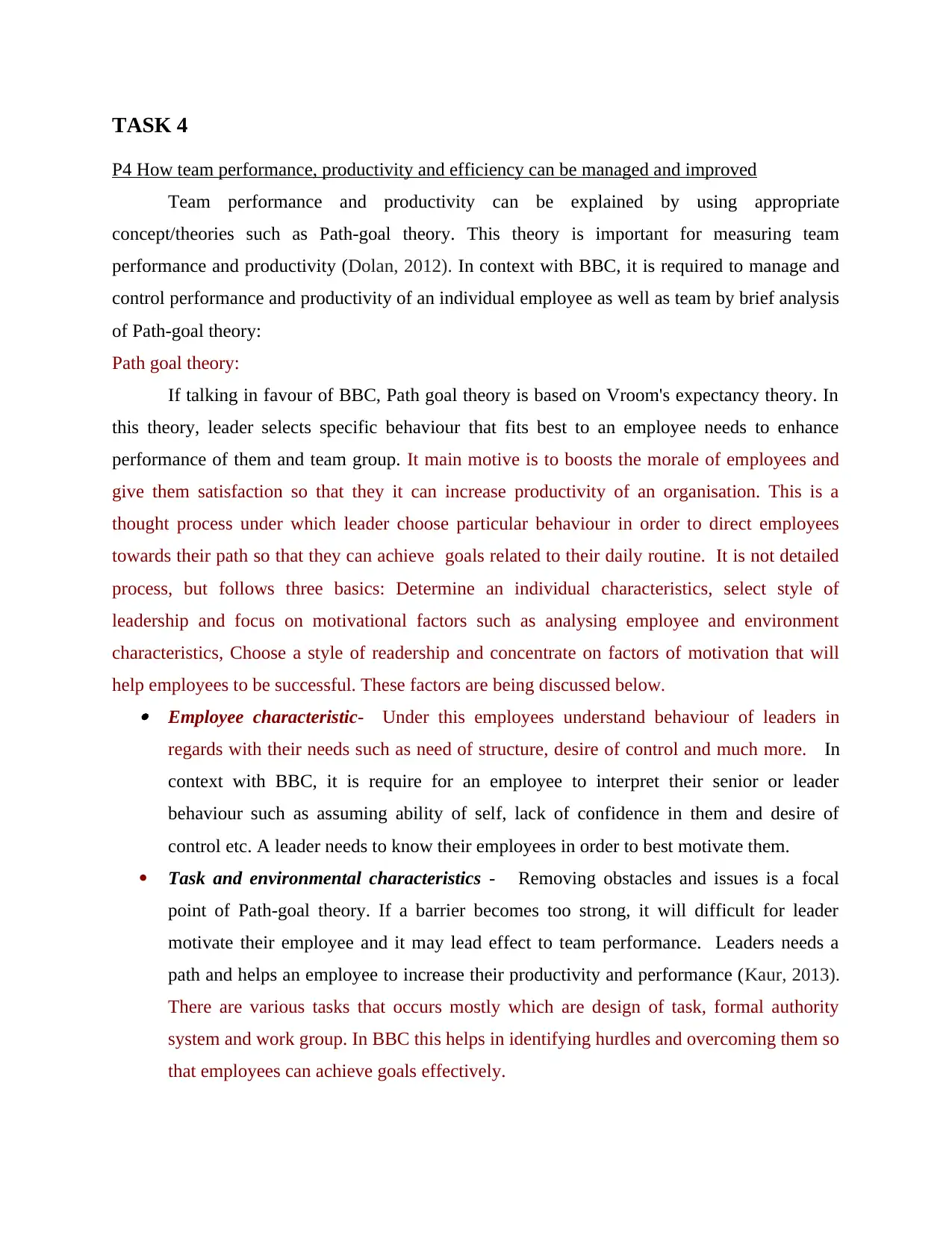
TASK 4
P4 How team performance, productivity and efficiency can be managed and improved
Team performance and productivity can be explained by using appropriate
concept/theories such as Path-goal theory. This theory is important for measuring team
performance and productivity (Dolan, 2012). In context with BBC, it is required to manage and
control performance and productivity of an individual employee as well as team by brief analysis
of Path-goal theory:
Path goal theory:
If talking in favour of BBC, Path goal theory is based on Vroom's expectancy theory. In
this theory, leader selects specific behaviour that fits best to an employee needs to enhance
performance of them and team group. It main motive is to boosts the morale of employees and
give them satisfaction so that they it can increase productivity of an organisation. This is a
thought process under which leader choose particular behaviour in order to direct employees
towards their path so that they can achieve goals related to their daily routine. It is not detailed
process, but follows three basics: Determine an individual characteristics, select style of
leadership and focus on motivational factors such as analysing employee and environment
characteristics, Choose a style of readership and concentrate on factors of motivation that will
help employees to be successful. These factors are being discussed below. Employee characteristic- Under this employees understand behaviour of leaders in
regards with their needs such as need of structure, desire of control and much more. In
context with BBC, it is require for an employee to interpret their senior or leader
behaviour such as assuming ability of self, lack of confidence in them and desire of
control etc. A leader needs to know their employees in order to best motivate them.
Task and environmental characteristics - Removing obstacles and issues is a focal
point of Path-goal theory. If a barrier becomes too strong, it will difficult for leader
motivate their employee and it may lead effect to team performance. Leaders needs a
path and helps an employee to increase their productivity and performance (Kaur, 2013).
There are various tasks that occurs mostly which are design of task, formal authority
system and work group. In BBC this helps in identifying hurdles and overcoming them so
that employees can achieve goals effectively.
P4 How team performance, productivity and efficiency can be managed and improved
Team performance and productivity can be explained by using appropriate
concept/theories such as Path-goal theory. This theory is important for measuring team
performance and productivity (Dolan, 2012). In context with BBC, it is required to manage and
control performance and productivity of an individual employee as well as team by brief analysis
of Path-goal theory:
Path goal theory:
If talking in favour of BBC, Path goal theory is based on Vroom's expectancy theory. In
this theory, leader selects specific behaviour that fits best to an employee needs to enhance
performance of them and team group. It main motive is to boosts the morale of employees and
give them satisfaction so that they it can increase productivity of an organisation. This is a
thought process under which leader choose particular behaviour in order to direct employees
towards their path so that they can achieve goals related to their daily routine. It is not detailed
process, but follows three basics: Determine an individual characteristics, select style of
leadership and focus on motivational factors such as analysing employee and environment
characteristics, Choose a style of readership and concentrate on factors of motivation that will
help employees to be successful. These factors are being discussed below. Employee characteristic- Under this employees understand behaviour of leaders in
regards with their needs such as need of structure, desire of control and much more. In
context with BBC, it is require for an employee to interpret their senior or leader
behaviour such as assuming ability of self, lack of confidence in them and desire of
control etc. A leader needs to know their employees in order to best motivate them.
Task and environmental characteristics - Removing obstacles and issues is a focal
point of Path-goal theory. If a barrier becomes too strong, it will difficult for leader
motivate their employee and it may lead effect to team performance. Leaders needs a
path and helps an employee to increase their productivity and performance (Kaur, 2013).
There are various tasks that occurs mostly which are design of task, formal authority
system and work group. In BBC this helps in identifying hurdles and overcoming them so
that employees can achieve goals effectively.
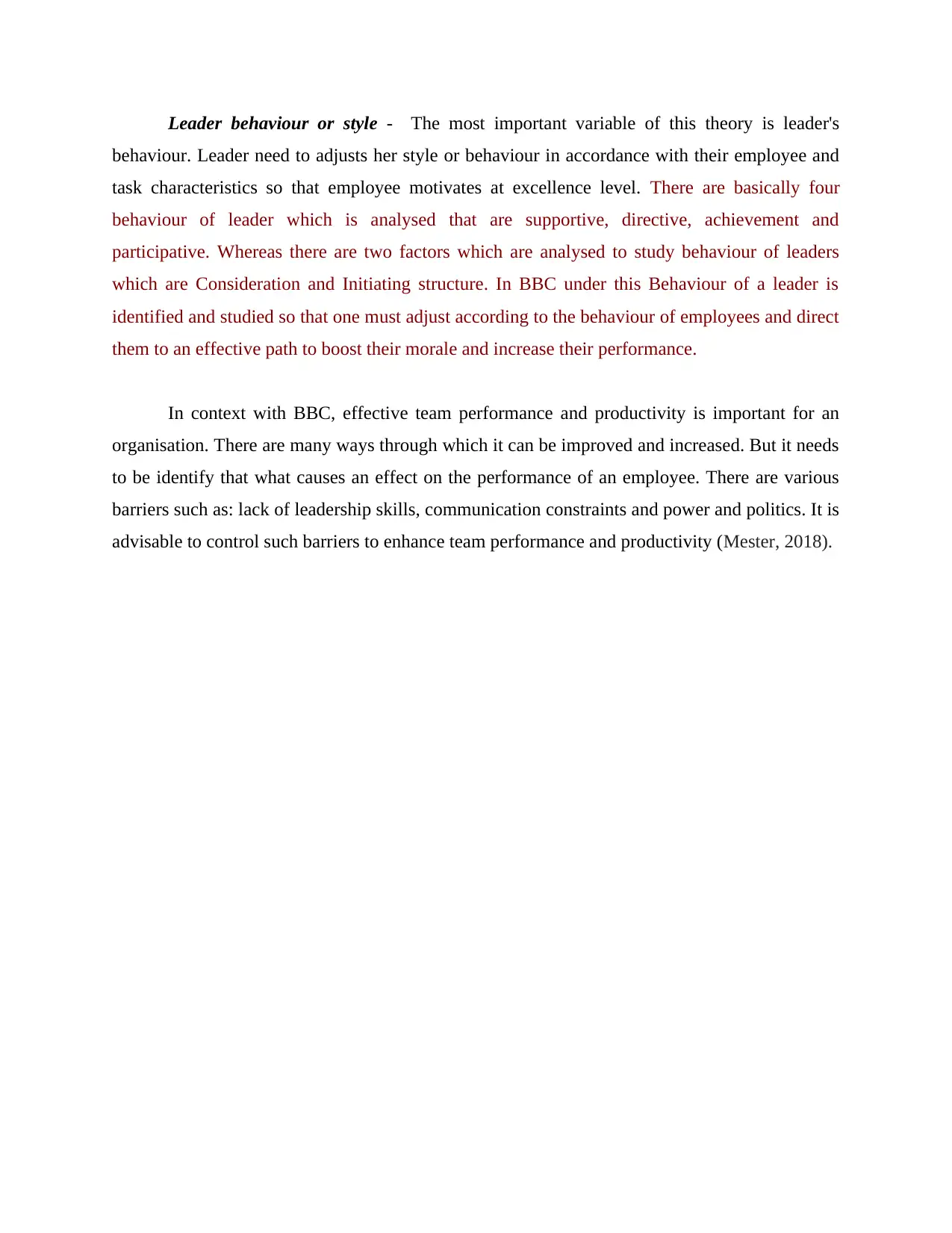
Leader behaviour or style - The most important variable of this theory is leader's
behaviour. Leader need to adjusts her style or behaviour in accordance with their employee and
task characteristics so that employee motivates at excellence level. There are basically four
behaviour of leader which is analysed that are supportive, directive, achievement and
participative. Whereas there are two factors which are analysed to study behaviour of leaders
which are Consideration and Initiating structure. In BBC under this Behaviour of a leader is
identified and studied so that one must adjust according to the behaviour of employees and direct
them to an effective path to boost their morale and increase their performance.
In context with BBC, effective team performance and productivity is important for an
organisation. There are many ways through which it can be improved and increased. But it needs
to be identify that what causes an effect on the performance of an employee. There are various
barriers such as: lack of leadership skills, communication constraints and power and politics. It is
advisable to control such barriers to enhance team performance and productivity (Mester, 2018).
behaviour. Leader need to adjusts her style or behaviour in accordance with their employee and
task characteristics so that employee motivates at excellence level. There are basically four
behaviour of leader which is analysed that are supportive, directive, achievement and
participative. Whereas there are two factors which are analysed to study behaviour of leaders
which are Consideration and Initiating structure. In BBC under this Behaviour of a leader is
identified and studied so that one must adjust according to the behaviour of employees and direct
them to an effective path to boost their morale and increase their performance.
In context with BBC, effective team performance and productivity is important for an
organisation. There are many ways through which it can be improved and increased. But it needs
to be identify that what causes an effect on the performance of an employee. There are various
barriers such as: lack of leadership skills, communication constraints and power and politics. It is
advisable to control such barriers to enhance team performance and productivity (Mester, 2018).
⊘ This is a preview!⊘
Do you want full access?
Subscribe today to unlock all pages.

Trusted by 1+ million students worldwide
1 out of 16
Related Documents
Your All-in-One AI-Powered Toolkit for Academic Success.
+13062052269
info@desklib.com
Available 24*7 on WhatsApp / Email
![[object Object]](/_next/static/media/star-bottom.7253800d.svg)
Unlock your academic potential
Copyright © 2020–2026 A2Z Services. All Rights Reserved. Developed and managed by ZUCOL.





